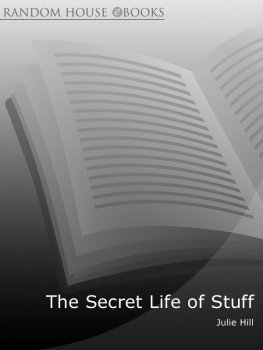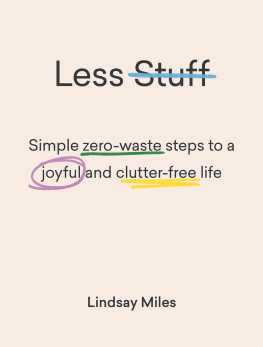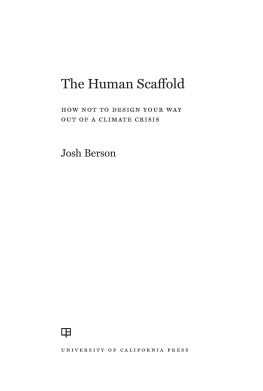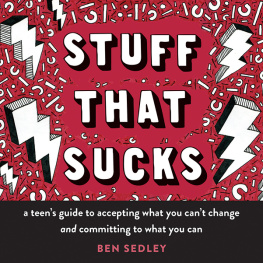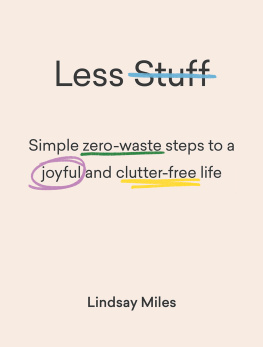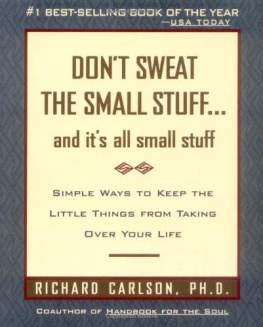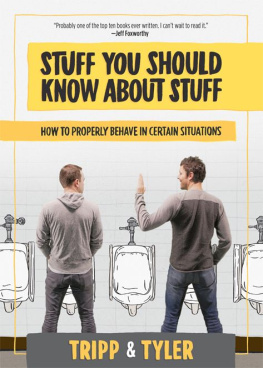About the Book
Wouldnt you like:
Products that dont damage the environment?
A better way of life without agonising about your footprint?
Guilt-free consumption?
Climate change? Biofuels? Landfills? Recycling? Renewable energy? Environmental issues can feel overwhelming. But, in fact, it all comes down to one thing stuff.
Our use of the Earths resources whether a crisp packet or a cargo ship, T-shirt or a wind turbine has an inescapable impact on our future. In The Secret Life of Stuff, Julie Hill uncovers the origins and true cost of what we use. Her inventory of over-consumption may shock but it is the first step towards overcoming waste. The misuse of stuff is not your fault, its a product of history. But it is only by understanding what has gone wrong, that everyone politicians, business people and us as consumers can create a new and better material world.
JULIE HILL
The Secret Life
of Stuff
A Manual for a new Material World

This eBook is copyright material and must not be copied, reproduced, transferred, distributed, leased, licensed or publicly performed or used in any way except as specifically permitted in writing by the publishers, as allowed under the terms and conditions under which it was purchased or as strictly permitted by applicable copyright law. Any unauthorised distribution or use of this text may be a direct infringement of the authors and publishers rights and those responsible may be liable in law accordingly.
Version 1.0
Epub ISBN 9781409040231
www.randomhouse.co.uk
Published by Vintage 2011
2 4 6 8 10 9 7 5 3 1
Copyright Julie Hill 2011
Julie Hill has asserted her right under the Copyright, Designs and Patents Act 1988 to be identified as the author of this work
This book is sold subject to the condition that it shall not, by way of trade or otherwise, be lent, resold, hired out, or otherwise circulated without the publishers prior consent in any form of binding or cover other than that in which it is published and without a similar condition, including this condition, being imposed on the subsequent purchaser
First published in Great Britain in 2011 by
Vintage
Random House, 20 Vauxhall Bridge Road,
London SW1V 2SA
www.vintage-books.co.uk
Addresses for companies within The Random House Group
Limited can be found at:
www.randomhouse.co.uk/offices.htm
The Random House Group Limited Reg. No. 954009
A CIP catalogue record for this book
is available from the British Library
ISBN 9780099546580
Contents
To my husband John, and to my boys, Alex and Rory. And to my Mum.
THE SECRET LIFE OF STUFF
Julie Hill has 25 years environmental experience, including working with governments, businesses, the environmental think-tank Green Alliance, the Environment Agency and the award-winning Eden Project.
Acknowledgements
I could not have written this book without my researchers: Simon Inglethorpe who wrote excellent briefings; Claire Thacker who crunched lots of numbers; and Thomas Turnbull who engaged in tireless tracking down of many sources and references. Heartfelt thanks also to Karen Crane, Patrick Mahon, Mary Orr, Mike Petty and Melissa Tombling for invaluable advice.
Thank you to Hannah Bateson, Dave Matthews and Natsuko Matsuoka for the letters from the real world. They were important in bringing me back to earth.
I also want to thank all those who were kind enough to read sections of the text, and in some cases wade through all of it, providing me with many leads and comments. Staff at the Eden Project, the Environment Agency, Green Alliance and WRAP were particularly helpful and engaged, although all those named below commented in a personal rather than organisational capacity:
Michael F. Ashby, Alison Austin, Mark Barthel, Steve Bass, Alain de Botton, Rosie Boycott, Jeannette Buckle, Germana Canzi, Nick Cartwright, Tracy Carty, Chris Chubb, Rebecca Cocking, Karen Crane, Linda Crichton, Paul Davison, Andy Dawe, Caroline Digby, Liz Dixon-Smith, Chris Dow, Jane Evans, Steve Evans, Jack Frost, Rose George, Ray Georgeson, Martin Gibson, Pam Gilder, Nigel Haigh, Richard Girling, Peter Goult, Ian Hetherington, Allan Hill, Susan Hill, Hannah Hislop, Belinda Howell, Jane James, Keith James, Andrew Jenkins, Peter Jones, Catherine Juckes, Miranda Kavanagh, Tony Kendle, Alan Knight, Michael Landy, Zoe Laughlin, Neal Lawson, Simon Leaf, Paul Leonard, Craig Liddell, Pete Lunn, Tom Macmillan, Julian Maikelm, Dorothy Maxwell, Daniel Miller, Nick Morley, Matthew Neilson, Julian Parfitt, Sara Parkin, Doug Parr, Sandy Pattisson, Michael Pawlyn, Fred Pearce, Georgina Pearman, Rob Pearson, John Pickup, Peter Reineck, John Sanderson, Peter Seggie, Ben Shaw, Tim Smit, Nina Sweet, Caron Thompson, Charles Thwaites, Michael Warhurst, Peter Whitbread-Abrutat, John Williams, Rebecca Willis, Jim Wiltshire, Stephen Wise and David Workman.
I must add that any mistakes or omissions are entirely my responsibility, especially after I have had such expert help from many quarters. Also that I am writing in a purely personal capacity, so any views expressed here do not necessarily reflect those of the organisations I work with, including the Eden Project, the Environment Agency, and Green Alliance.
A special thank you to my editor at Vintage Books, Rowan Yapp, who was superb at boosting my confidence throughout the process.
Finally, it is customary to thank ones family for putting up with the whole exercise, and I do thank them, they were hugely patient and supportive. Im also tempted to say that they should thank me, because without this book they would not have been treated to many fascinating dinner-table discussions about the origins of plastic or what to do with sewage sludge. But I suspect that may be over-optimistic.
Part 1
Future and Past
1
A tapestry
I wanted to write this book to tell a story. As I was writing, it seemed more like a tapestry, with a large number of shining, interwoven threads. We humans can achieve greatness when we put our minds to it. We have surrounded ourselves with things that are ingenious and delightful, augmenting the joy that is all around us in the shape of the natural world. But Im dismayed at how little we understand the complexity of the material world that sustains us, in all its gloriously varied forms and with all its unexpected qualities. We all love stuff I am no exception but we rarely know where it comes from and where it goes, and the shadow it casts. We get the bad side of stuff from some shock-horror headlines, but they are sporadic and unconnected. We rarely appreciate the effort that turns materials into the stuff around us, the effort put in by people from all over the world, using natures riches. We are blessed in many senses, but not in this essential knowledge. We lack insight and literacy; we are oblivious to the secret life of stuff.
I hope to change that. I started work in the environment movement more than twenty-five years ago, and while some things have got better in that time, a lot havent, so dismay is sometimes an unavoidable component of my life. Yet I remain an unashamed optimist. I am inclined to blame the lack of progress on insufficient political leadership, but perhaps it is us that are unwilling to be led. If that is the case, the upside is that there is ample room for change. I believe that if the secret life of stuff was less secret, we would all buy into change more fervently than we have to date, and we would be pestering governments and businesses to provide us with the means for change. Exploring stuff has made me feel better equipped to ask for the right things. In fact, not just ask for them, but expect them, and expect them as standard. That way, I dont have to agonise over the choices.

